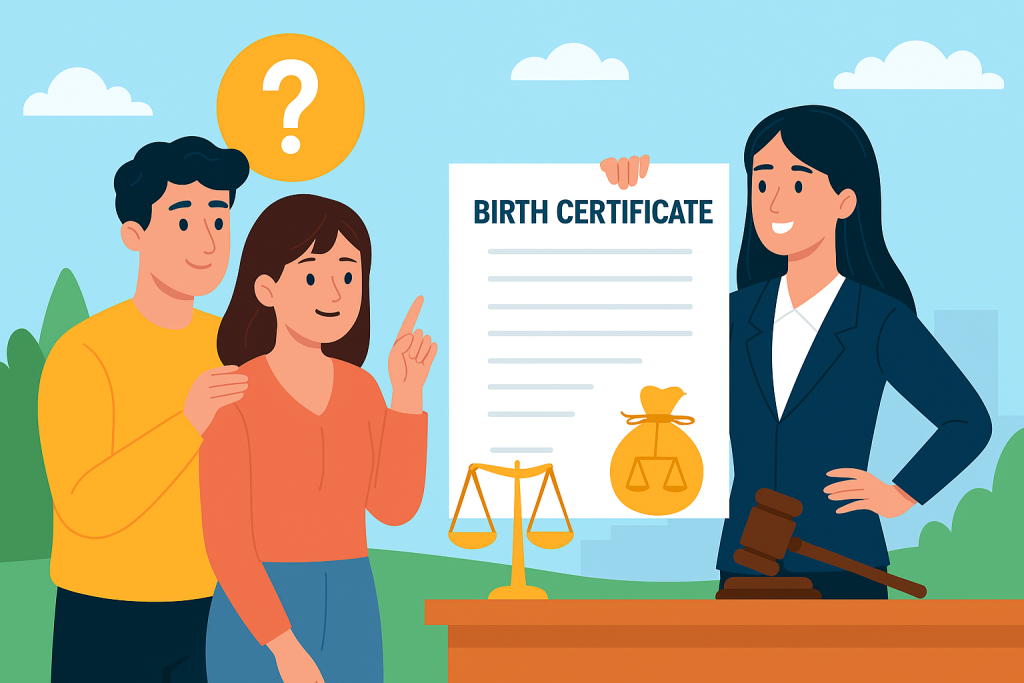
I. Right to Birth Registration
According to Article 30 of the 2015 Civil Code, the right to birth and death registration is stipulated as follows:
Article 30. Right to birth and death registration
- Every individual, from the moment of birth, has the right to be registered for birth.
- Every individual who dies must be registered for death.
- A child born alive for at least 24 hours and then dies must be registered for both birth and death. A child born alive but surviving less than 24 hours is not required to be registered, unless requested by the parents.
- Birth and death registration are governed by civil status laws.
Thus, every child born is entitled to a birth certificate. A child who lives more than 24 hours after birth must be registered for both birth and death. Therefore, whether the parents are legally married or not does not affect the child’s right to a birth certificate.
II. Responsibility for Birth Registration
Pursuant to Clause 1, Article 15 of the 2014 Law on Civil Status:
“Within 60 days from the date of birth, the father or mother is responsible for registering the child’s birth. If the father or mother cannot register, then the grandparents, relatives, or the individual/organization currently raising the child shall undertake the responsibility of registering the birth.”
III. Dossier and Procedures for Birth Registration when Parents Are Not Married
According to Article 15 of Decree 123/2015/NĐ-CP, the procedures for registering the birth of a child whose parents have not yet been legally determined are as follows:
- The People’s Committee at the commune-level where the child resides shall be responsible for registering the birth of a child without determined parent(s).
- If the father has not been identified at the time of registration, the child’s surname, ethnicity, hometown, and nationality are determined based on the mother’s information. The section for the father’s details in both the Civil Status Register and the Birth Certificate shall remain blank.
- If the father wishes to carry out the recognition of paternity simultaneously with the birth registration, the People’s Committee shall process both matters together. The birth certificate will then reflect the paternity accordingly.
- If the mother has not been identified but the father requests recognition of paternity, procedures shall follow Clause 3, Article 15 of the Decree. The mother’s details in the Birth Certificate and Civil Status Register will remain blank.
- For children who are not abandoned but whose parents are unidentified, the Civil Status Register must note: “Child with unidentified parents.”
👉 In your specific case, the father (your fiancé/partner) must submit an application for recognition of paternity along with supporting documents proving the father-child relationship to the civil status authority.
The dossier for birth registration combined with paternity/maternity recognition includes:
- Birth registration form;
- Application form for recognition of paternity/maternity;
- Birth certificate or substitute document;
- Evidence proving the parent-child relationship (documents issued by medical authorities, forensic institutions, or other competent bodies). If such evidence is not available, the parties may submit a sworn statement with at least two witnesses confirming the relationship.
Birth registration procedures follow Article 16 of the 2014 Law on Civil Status:
The applicant must submit the required forms and the child’s birth certificate to the civil status authority. If a birth certificate is unavailable, a witness statement must be provided. If no witnesses exist, a sworn declaration about the birth is required. In cases of abandoned children, an official report must be submitted; for children born through surrogacy, legal documentation of surrogacy must be provided.
Once a complete dossier is submitted, if the information is accurate, the civil status officer will record the details into the Civil Status Register and update the National Population Database to issue a Personal Identification Number for the child.
IV. Commentary
These legal provisions reflect the protection of fundamental personal rights from the moment of birth, regardless of the marital status of the parents. The 2015 Civil Code affirms that every individual has the right to birth registration, and this responsibility falls primarily on the parents (or relatives) within 60 days as prescribed by the 2014 Law on Civil Status.
For cases where the parents are not married, or where one or both parents are unidentified, Decree 123/2015/NĐ-CP provides clear guidance on required documents, procedures, and methods of recording information in the Civil Status Register. This ensures that a child’s rights are not affected by the parents’ legal status.
In conclusion, the current legal framework not only guarantees every child’s right to a birth certificate but also assigns clear responsibilities to parents and competent authorities, while allowing flexibility for special circumstances such as unidentified parents or combined birth registration with paternity/maternity recognition. This contributes to ensuring that every child has legal identity, protection, and access to legitimate rights under the law.
📞 CONTACT LEGAL CONSULTANT:
TLA Law is a leading law firm with a team of highly experienced lawyers specializing in criminal, civil, corporate, marriage and family law, and more. We are committed to providing comprehensive legal support and answering all your legal questions. If you have any further questions, please do not hesitate to contact us.
1. Lawyer Vu Thi Phuong Thanh, Ha Noi Bar Association
Email: vtpthanh@tlalaw.vn
2. Lawyer Tran My Le, Ha Noi Bar Association
Email: tmle@tlalaw.vn
Khương Ngọc Lan

